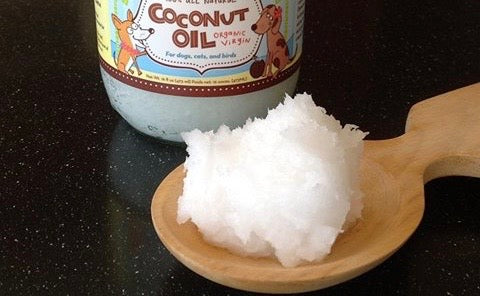Did you know that medium-chain fatty acids (MCFAs) help train the immune system during infancy and keep it in good working order throughout our lives? In this article, we'll take a look at the science behind the immune-boosting properties of MCFAs. We'll also explain how virgin coconut oil can help boost the immune system in people and pets.
What Are MCFAs?
Medium-chain triglycerides (MCTs) are a type of fat (lipid). All fats and oils are made of triglycerides, and there are many different types. When consumed, the body breaks down MCTs into medium-chain fatty acids (MCFAs), a special group of fat molecules composed of chains of 6-12 carbon atoms.
These fatty acids have antibacterial, antiviral, antifungal, and antimicrobial properties. They have been shown to effectively kill potentially harmful microorganisms such as bacteria, viruses, yeast, fungi, and parasites. MCFAs are utilized by the body to support many cellular processes. They are also completely harmless to pets and people, and are actually used by the body as a source of energy.
The Truth About LPS and Inflammation
Many of the bacteria that MCFAs destroy have an outer cell membrane composed of lipopolysaccharides (LPS). Some LPS fragments from the destroyed bacteria are small enough to pass through the epithelial lining and into the intestinal wall. Here the fragments are picked up with fatty acids, amino acids, and other substances and packaged into chylomicrons (small packets or globules of fats). They are then eventually carried into circulation.
In the bloodstream, LPS is recognized as a foreign invader – a bacterium. And its presence can stimulate the production of white blood cells to defend the body. When this happens, a mild, short-term inflammatory reaction can occur. This is the body’s normal reaction to a potential threat.
According to world-renowned lipids expert Dr. Bruce Fife, C.N., N.D.:
"Contrary to popular belief, inflammation isn’t something that is bad or evil, it is the normal process in which the body mounts a defense and fights off infection. In most cases, it is a good thing, as it is protecting the body. Only when inflammation becomes chronic and never shuts down does it become a problem. This only happens when there is a stimulus that constantly triggers inflammation, such as a chronic infection or tissue irritation. The slight immune reaction from LPS, after eating MCTs, is only temporary and not a chronic condition. Interestingly, infants and people who eat diets high in MCTs (breast milk, coconut, and full-fat dairy), generally have low C-reactive protein (CRP) levels. CRP is a marker for systemic inflammation."
So, what does all this mean? Simply put, consuming MCTs does not trigger systemic inflammation, although there may be a temporary increase in white blood cell production. In fact, this increase in white blood cells actually enhances immune function in people and pets! More immune cells on the job means more cells are at work, seeking out and eliminating all potentially harmful troublemakers, not just bacteria, but viruses, yeasts, parasites, toxins, cancerous cells, and LPS fragments.

How LPS Trains the Immune System
LPS is part of the cell membrane of many pathogenic bacteria and is not the whole living organism. LPS is often used in medical research as a means to stimulate an immune response without the threat of causing an actual infection. Unlike living bacteria, it can’t multiply and grow. It is defenseless against the immune system.
For this reason, LPS provides a valuable tool to condition and train the immune system without danger. This is especially important in infants (both human and animal), whose immune systems are still learning how to recognize harmful substances. Nursing infants eat a very high-fat diet. About 56 percent of the calorie content in human breast milk comes from fat, half of which is saturated fat.
Dog and cat milk is similarly rich in saturated fats, including MCTs. Many of these fats, particularly lauric, capric, and caprylic acids, have the ability to kill potentially harmful bacteria in the gut. LPS fragments from the dead bacteria are then absorbed into the bloodstream and initiate a mild immune response. This way, the infant’s immune system is trained to recognize harmful microorganisms. This process continues in adults, keeping the immune system sharp and ready to leap into action whenever potentially harmful living invaders enter the bloodstream.
The Saturated Fat Myth
Because of the process outlined above, some people – in an attempt to cast criticism on saturated fats – have suggested that eating diets high in saturated fat promotes systemic inflammation leading to the development of obesity, diabetes, heart disease, and other disorders associated with chronic inflammation. They claim that saturated fat (particularly coconut oil or MCTs), is proinflammatory, and therefore, causes chronic inflammatory related disease. In their zeal to find reasons to condemn saturated fat and coconut oil, they overlook the obvious.
Fat has always been an important part of the human diet (and is essential for dogs and cats). Some populations, such as the Inuit, native Siberians, the Maasai of Africa, and many others subsisted and thrived on very high saturated fat diets, including many Asian and Polynesian populations who consume a large amount of coconut. Coconut oil and MCT oil are popular sources of fat in the high-fat ketogenic diet.
Over the past century, thousands of people have embraced the ketogenic diet, some for extended periods lasting many years, and have not experienced obesity, diabetes, or heart disease. In fact, just the opposite happens; those on ketogenic diets generally lose excess weight, develop better blood sugar control, and reduce their risk of heart disease. The high saturated fat diet didn’t harm them, but made them healthier.
Instead of being inflammatory, coconut oil has been shown to calm inflammation. Despite it being composed of 92 percent saturated fat, numerous studies have demonstrated its anti-inflammatory effects.
MCTs and other antimicrobial fatty acids are essential in establishing a healthy gut microbiome in newborn infants (and pets) and extremely helpful in maintaining a healthy microbial population throughout life. Since MCTs are a major component of human and animal breast milk, it seems absurd that mothers would produce a food that would cause chronic inflammation and disease in their young.
The absorption of LPS is a normal and universal process that occurs in both humans and animals. It is not a defect in biology or some freakish abnormality caused by eating fat. In animals, the process is the same. Carnivores and many omnivores, for example, eat a lot of meat and fat but do not become obese or develop diabetes or heart disease. However, dogs and cats fed pet foods high in processed grains, soy, and other carbohydrates with only moderate fat, often do develop these human diseases. Obviously, meat and fat do not cause these problems in animals or in humans.
MCFAs in Coconut Oil
Virgin coconut oil is the richest source of MCTs found in nature. It is broken down by the body into different types of beneficial MCFAs. Coconut oil contains 64% MCFAs. Therapeutic-grade oil such as CocoTherapy coconut oil contains high levels of lauric acid (at least 53% compared to 40% - 45% in grocery store brands). It also contains capric acid and caprylic acid, which are responsible for a number of health benefits.
Lauric acid is often considered the most beneficial of the MCFAs. It is antibacterial, antimicrobial, and antiviral. It also gives coconut oil its immune-supporting properties and promotes overall health. Capric and caprylic acid are known to have powerful antifungal properties and support a range of healthy bodily functions.
Supplementing your pet's diet with coconut oil is a fantastic way to support their overall health and protect them from illness throughout their lifetime. Just be sure to choose a high-quality oil such as CocoTherapy Virgin Coconut Oil. Our oil contains high levels of MCFAs that are responsible for the health benefits we've outlined in this post. It's a natural, healthy product that's backed by science and has been successfully used to improve human and animal health for centuries.
For more information about the benefits of virgin coconut oil, check out our Health Benefits page.



